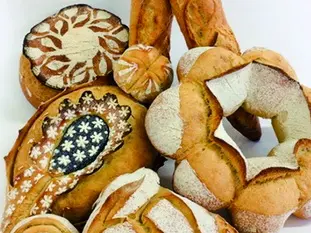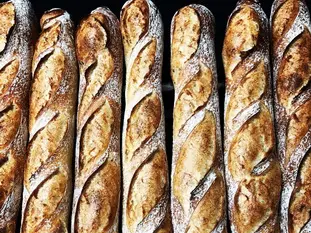This site uses only a few technical cookies necessary for its operation. By continuing to browse, you accept their use.
To find out more...
To find out more...
The long fermentation of bread

I had already told you in a previous article about the delicious little alchemy that happens when we make bread, let's try to go a little further this time, and try to discover what makes a good bread, in other words, which has taste.
10 K 4.9/5 (17 reviews)
Keywords for this post:BreadFermentationLongTimeBakingTasteLeavenYeastRestLast modified on: April 13th 2023
The long fermentation of bread
So I detailed how, from a simple mixture of flour, water, salt and a little yeast or leaven, we obtain this extraordinary food that is bread. It is already something almost magical, but what is the secret of the breads that have taste vs those that are bland?
Curiously enough, the recipe doesn't change much, it's always the same ingredients, in varying proportions, but we always stay with the flour-water-salt-yeast mixture.
It's all a question of fermentation time. Its main purpose is always that the yeasts transform part of the starch of the flour and produce CO2 that will form the crumb, but this can be done quickly or not.
And precisely if it is done slowly, or even very slowly, the production of CO2 is still done, but in addition the dough of the future bread develops, very slowly, particular aromas which will be revealed during the cooking.
As a general rule, the longer the fermentation, the better the bread will taste, and this without really changing its appearance. In other words, a bread with a quick fermentation and a bread with a long fermentation will look pretty much the same. If you are not a baker, it will be hard to tell the difference.
And yet this is where the distinction is made:
- On the one hand a baguette kneaded and made in a hurry, in an industrial bakery or at a mediocre baker's, with a lot of yeast, and a fermentation accelerated by a stay in the heat in 1 or 2 hours => A rather bland, neutral baguette.
- On the other hand, a baguette kneaded slowly and fermented slowly in the cold for 24 or 48 hours, sometimes more => A baguette full of taste and aroma, a delight.
You will have guessed it, there is of course an economic aspect to this difference, to make a baguette in long fermentation takes more time and costs more than a baguette "express", but we are really not on the same product, even if they can be similar.
Here is one of the secrets of good bread, it takes time (and love of course), and a good part of this time is dedicated to the fermentation of the dough, it is the magic moment where the savors and aromas are formed.
Curiously enough, the recipe doesn't change much, it's always the same ingredients, in varying proportions, but we always stay with the flour-water-salt-yeast mixture.

It's all a question of fermentation time. Its main purpose is always that the yeasts transform part of the starch of the flour and produce CO2 that will form the crumb, but this can be done quickly or not.
And precisely if it is done slowly, or even very slowly, the production of CO2 is still done, but in addition the dough of the future bread develops, very slowly, particular aromas which will be revealed during the cooking.
As a general rule, the longer the fermentation, the better the bread will taste, and this without really changing its appearance. In other words, a bread with a quick fermentation and a bread with a long fermentation will look pretty much the same. If you are not a baker, it will be hard to tell the difference.
And yet this is where the distinction is made:
- On the one hand a baguette kneaded and made in a hurry, in an industrial bakery or at a mediocre baker's, with a lot of yeast, and a fermentation accelerated by a stay in the heat in 1 or 2 hours => A rather bland, neutral baguette.
- On the other hand, a baguette kneaded slowly and fermented slowly in the cold for 24 or 48 hours, sometimes more => A baguette full of taste and aroma, a delight.
You will have guessed it, there is of course an economic aspect to this difference, to make a baguette in long fermentation takes more time and costs more than a baguette "express", but we are really not on the same product, even if they can be similar.
Here is one of the secrets of good bread, it takes time (and love of course), and a good part of this time is dedicated to the fermentation of the dough, it is the magic moment where the savors and aromas are formed.
Lasts posts
XO Cognac Explained: Meaning, Aging, and Flavor Profile
XO Cognac always goes beyond the labels on the bottle: it is often associated with tradition and quality. You get to appreciate the artistry, character and ageing process when you understand what defines this smooth Cognac. The section below tackles everything about XO Cognac, from complex flavour...January 28th 20261,037 Sponsored article
Butter vs. grease
We often read in a recipe where a pastry is put into a mould that, just before pouring, the mould should be buttered or greased. But what's the difference between these 2 terms?December 1st 20252,6545
Getting out of the fridge early
Very often when you're cooking, you need to take food or preparations out of the fridge, to use them in the recipe in progress. There's nothing tricky about this: you just take them out of the fridge and use them, usually immediately, in the recipe. But is this really a good method?November 24th 20251,7015
Who's making the croissants?
When you look at a bakery from the outside, you naturally think that in the bakery, the bakers make the bread, and in the laboratory, the pastry chefs make the cakes. It's very often like that, with each of these professions having quite different ways of working, but sometimes there's also one...November 23th 20251,552
Oven height
When we put a dish or cake in the oven, we naturally tend to put it on the middle shelf, and that's what we usually do. But in some cases, this position and height can be a little tricky, so let's find out why.October 8th 20255,2565
Other pages you may also like
85 grams of eggs?
Some time ago, I already spoke to you about the difference between baking and pastry-making, I emphasized, among other things, the precision of pastry-making which requires grams, cm, degrees and minutes. That's why, on the one hand, you have baking and cooking, where a certain tolerance is...November 26th 201857 K4.6
The dissociation of a preparation
It may have already happened to you: You prepare a sauce, a cream, a ganache etc. and then suddenly or almost, the whole thing dissociates, and from a smooth mixture that you were preparing with love, you end up with a horrible thing with a more or less solid part and another liquid part. It's...January 22th 202213 K4.9
The "pith" of the cauliflower
When using cauliflower in a recipe, there is a lot of preparation work at the beginning: removing the leaves, taking the tops or florets, etc. It's a bit tedious, but in the end you're left with the best of the cauliflower, ready to be used in your recipe.February 5th 202214 K4.9
Sugar syrups
In cooking, and especially in pastry, we often use sugar syrups, a simple mixture of water and sugar in varying proportions. Here is a presentation of their differences. .January 17th 202313 K4.8
No need to boil gelatin
Gelatin is a magical ingredient for making light, creamy, structured desserts, yet it's often misused in the kitchen. A common mistake in some recipes is the idea that it needs to be boiled for it to work properly, but this is a mistake indeed: gelatin melts at a much lower temperature, around...November 21th 20249,2335
Post a comment or question
Follow this page (as 2 people already do)
If you are interested in this page, you can "follow" it, by entering your email address here. You will then receive a notification immediately each time the page is modified or a new comment is added. Please note that you will need to confirm this following.
Note: We'll never share your e-mail address with anyone else.
Alternatively: you can subscribe to the mailing list of cooling-ez.com , you will receive a e-mail for each new recipe published on the site.









